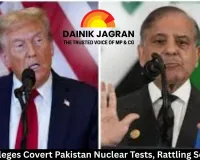Bangladesh Shuts Down as Awami League Protests Sheikh Hasina’s Death Sentence
Digital Desk

Bangladesh saw a nationwide shutdown on Monday after the banned Awami League called for a general strike to protest the death sentence handed to former Prime Minister Sheikh Hasina. The verdict, delivered by the Dhaka-based International Crimes Tribunal (ICT), has triggered a sharp political backlash, with the party demanding the resignation of interim Chief Adviser Mohammad Yunus and his cabinet.
The Awami League dismissed the judgment as “politically driven.” Senior leader Jahangir Kabir Nanak, in a video message on the party’s official Facebook page, alleged serious procedural flaws, claiming the trial was rushed and lacked transparency. He said hearings were conducted on only 20 days between August 14 and November 17, despite the tribunal listing 84 witnesses, of whom just 54 were examined. Nanak also questioned how the ruling was announced even though the chief judge had reportedly been absent for a month.
Hasina was convicted of ordering killings during the 2024 student protest movement. The tribunal found her guilty in five cases, sentencing her to death in two and life imprisonment in the remaining charges. Former Home Minister Asaduzzaman Khan received the same capital punishment, while ex-police chief Abdullah Al-Mamun was awarded a five-year jail term after turning state witness. The court also ordered the confiscation of the properties of Hasina and Khan.
Following the verdict, interim Prime Minister Yunus urged India to deport Hasina, who is believed to have sought refuge across the border. New Delhi responded cautiously, saying it had “taken note” of the ruling and reiterated its commitment to supporting peace, stability, and democratic processes in Bangladesh. The Ministry of External Affairs said India would continue constructive engagement with all stakeholders.
The tribunal that issued the sentence was originally set up under Hasina’s own government in 2010 to prosecute war crimes related to the 1971 Liberation War. With tensions rising and fresh protests expected, Bangladesh faces a volatile political stretch ahead.

.jpg)









